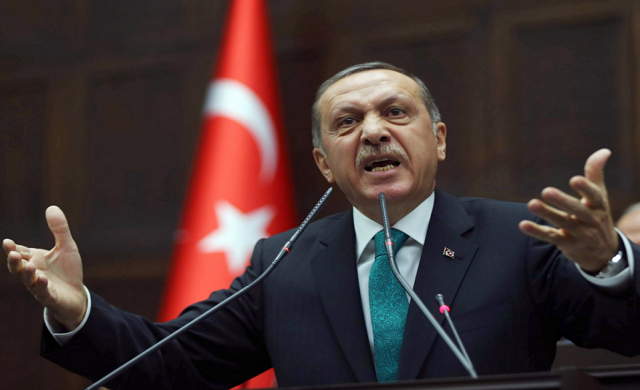If the regulatory body that oversees Turkey’s voting process, YSK approves Erdogan’s victory, it is no doubt that it will lead to more authoritarianism without fixing any economic complications. In fact, Turkey’s economy and the economic forecasts do not look dazzling.
The investors are worried about Central Bank’s independence as Erdogan has made no secret about his desire for lower interest rates. He is one of the most powerful presidents in the political systems around the world and the presidential system will certainly give him a colossal ability to sway Central Bank decisions and perhaps also change the mandate.
The immediate impact on the markets were clear as the trading opened this morning. The Turkish lira-TRY strengthened 2.4%; biggest jump it had over 3 months. It seems that the investors are greeting this positively. Apart from their poor currency, Turkey’s economy is looking at a serious current account deficit, fiscal deficit, high inflation, central bank losing credibility, so there is still a lot of fundamental reasons to be worried about the country’s political and economic stability.
Ultimately, the Turkish lira; TRY is one of the currencies that stands out the most by being the most volatile currency and it is also one of the worst performer so far this year. As a matter of fact; the real political issue could be with the elections which are expected to take place in 2019, potentially ratifying the strength of power all within Erdogan.

– He has stated that he would immediately consider a second referendum; a referendum in re-instituting the death penalty. Given the fact that the country has been trying to join the EU since decades and this statement along with any referendum decision will cause a problem with the EU.
– Immediately after the results, the EU officials complained not only about the possibility of a second referendum but the constitution package itself saying that it could cause problems. Thus, we can claim that the political uncertainty is not entirely over.
– Erdogan also stated that he would ‘’re-visit’’ the EU relationship after the vote. It is unclear what he tried to say but we will be watching closely in the days ahead.
– The opposition parties stated that they will take the ‘’fake’’ and ‘’uncounted’’ votes to the higher election board; the regulatory body that oversees Turkey’s voting process but; it did not sound that they would get very sympathetic response.
What does the result mean to Central Bank’s fiscal power?
– One of the biggest fear of investors was the Central Bank of Turkey losing its independence and Erdogan’s interference in the economic policies.
– Interestingly, the investors have greeted this result with a little bit of grief rally but there’s a contradiction. Now that he will be able to interfere in any economic policy making, he will have a greater say in the economy; which investors might end up resenting.
So what sort of powers did Erdogan get now?
– Power to abolish the prime minister’s office
– Giving executive power to the president instead; who could then issue decrees, appoint and remove judges and ministers
– The president would be allowed to lead his political party rather than being impartial
– If you look at the terms of the referendum, the maximum terms you can do is 3 term; another potential 15 years of him staying in power
– The president can dissolve parliament any time, triggering new elections for parliament as well as his own job
– He can declare state of emergency; potentially infringing basic rights and freedom
The central bank of Turkey is definitely losing credibility coming under some pressure to not hike interest rates and now, all eyes are going to be on the meeting of Central Bank which will be on the 26th of April.
Are we expecting an economic growth for 2017?
– The economic growth is expected to remain weak and the exports to fall
– The inflation has risen to its highest level of more than 8 years
– The consumer prices increased by 11.29% in March compared to February report
– The unemployment rate has hit 7-year-high at 13% in January
– Turkey’s current account deficit reached $2.53 billion in February – indicating an increase of $564 million compared to last February
– Compared to last year, the Tourism businesses are down 90%
– Foreign direct investment has fallen by almost 40%
– Consumer price index increased by 11.29% compared to last year- cost of food and housing went up at a faster pace
– The credit cart debt increased 31% in 2012, in 2013, rose additional 22% and now consumer debt in Turkey equals 55% of household disposable income; more foreign investors not wanting to finance this debt
– The government spending in Turkey is expected to be 3.74 million TRY this quarter and estimated to stand at 5.5 million TRY in 12 months’ time
– Turkey appears closer to a full-blown currency crisis
– Last year, Moody’s Investors Service followed Standard & Poor’s by downgrading Turkey’s credit rating to junk; leaving Fitch Ratings as the only major agency that rates the country as investment-grade. At their last report, they have also mentioned that ‘’Turkey is one of the most fragile countries against the systemic risk’’
– The danger now is not only that Turkey’s economic growth will stop, but that it will stop under rising inflation. According to some economists, the worst scenario would be ‘’stagflation’’
– Turkey will need a long-term plan for Syrian refugees as there is nearly 3 million Syrians residing in Turkey, making 3.5% of Turkey’s population. Majority of the population possesses low skill sets and face language barriers. According to a survey; the 80% of the refugees residing outside of refugee camps have 8 years of education or less
– On the other hand, the Syrians were given an opportunity to become entrepreneurs with more rights as well as exemptions compared to Turkish citizens; hoping for them to contribute to the economy but has failed dramatically
– Syrians were given the right to vote and decide how Turkey should be ruled
– Turkey’s agricultural sector shrank by 6% in 2016 due to plunging exports and the decline in prices in the domestic market
– Possible increase in brain migration to developed countries and the low-skilled population remaining in Turkey will potentially slow the growth of the country’s economy in the long-term
– Turkey Wealth Fund Project- founded in August 2016 owned by Government of Turkey containing THY, Ziraat Bank, PTT, Turksat, Borsa Istanbul, Halkbank to finance large infrastructure projects and to secure a credit at low rates for these projects by offering the shares in these companies as a guarantee. The wealth fund of Turkey is another example of ‘’Erdoganization’’ of the economy and his investments are not focused on creating jobs to improve the economy as a whole.
The staggering doubt is that the systemic weakness could unfold into crisis. The economic growth tumble amid terrorism, a sharp tourism downtrend, devaluation and the increase in the oil prices were just the ones on the surface. Nonetheless, a weaker currency can potentially prompt local-currency debtors to quest foreign currency, pushing lira even further down and prompting further demand in foreign currency. However, Erdogan’s new decisions and announcements will have a bigger impact on the currency and in the financial markets in the upcoming days.




 Hot Features
Hot Features











